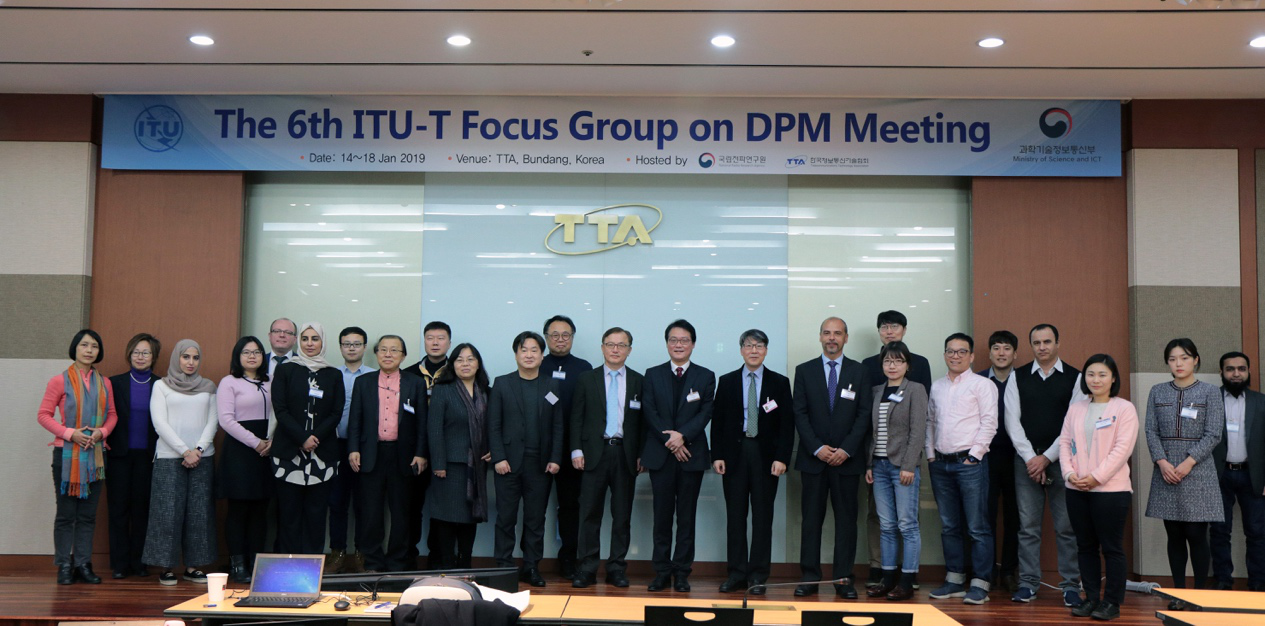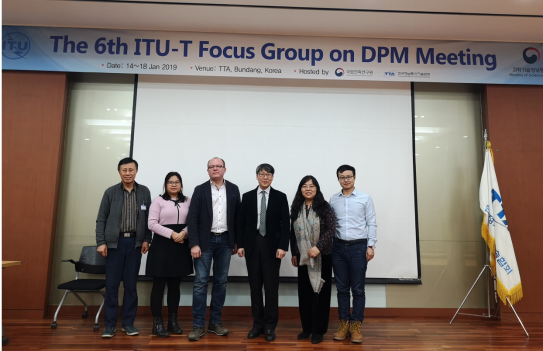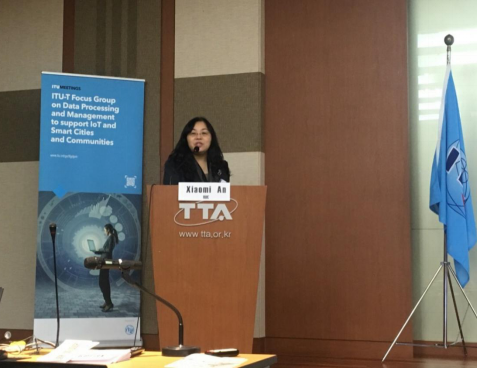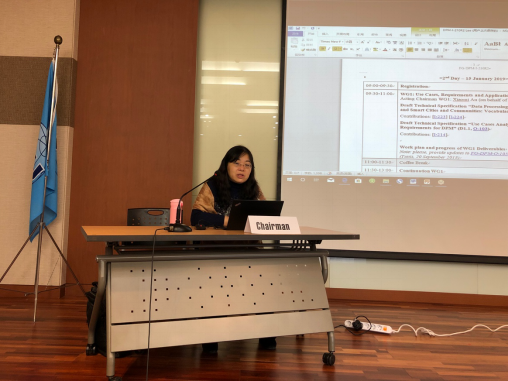
2019-01-25
From Jan. 14 to Jan. 18, 2019, the International Telecommunication Union Standardization Unit (ITU-T) supported the Data Processing and Management Focus Group (FG-DPM) of Internet of Things and Smart Cities and Communities (SC&C) in the South Korean Pentang Korean Communications Technology Association (TTA) building. This conference includes the third Internet of Things and Smart Cities and Communities Seminar on Data Processing and Management and the sixth Internet of Things and Smart Cities and Communities Focus Group Plenary Session on Data Processing and Management. Thirty-eight experts and scholars from China, Korea, Japan, the United Arab Emirates, Switzerland, France, the United Kingdom, Tunisia, Denmark, Canada, Senegal and other countries participated in the discussion to discuss the Internet of Things and international standards for data processing and management in smart cities and communities.

A group photo of some delegates
For the first time, Professor An Xiaomi led team member Dr. Jia Xiaoshuang and doctoral student Wei Wei to attend the face-to-face meeting.

Professor An's team members and ITU-T FG-DPM Chairman and Secretary
On January 14, the third ITU Telecom Standardization Department supported the Working Group on Internet of Things and Intelligent Cities and Community Data Processing and Management. Professor An Xiaomi, as the convenor of the term working group of the IEC Smart City Systems Committee, introduced the progress of the term working group of the IEC Smart City Systems Committee at the seminar, and put forward the global methodological synergy topic of the term construction of the Smart City Complex System.

Professor An Xiaomi spoke at the seminar
On the morning of January 15, the Sixth ITU Telecom Standardization Department-supported Focus Group Meeting on Internet of Things and Intelligent Cities and Communities Data Processing and Management continued. As the Executive Chairman of Working Group I (Use Cases, Requirements and Applications/Services), Professor An chaired the meeting of Working Group I and presented a report on the work of Working Group I to the General Assembly. He organized and discussed the draft technical specifications and 12 technical specifications for data processing and management terminology of Internet of Things and Smart Cities and Communities submitted by Professor An's team. The technical report on mapping key terms of data processing and management use cases to conceptual models of data processing and management is presented. Five new data processing and management use cases submitted by Japanese experts are discussed. It was agreed that the new technical terminology Specification would include all data processing and management terms and definitions from all ITU-T FG-DPM outputs. Methodologies for the construction of terminology conceptual system and terminology classification system would be separated from the original input documents and become specialized technical reports. Professor An continued to preside. In addition, Professor Am is recommended to analyze the general requirements and capability descriptions of 17 data processing and management use cases.

Professor An presided over Working Group I as Executive Chairman
From the afternoon of 15 January to the afternoon of 17 January, the meeting discussed Working Group II (DPM framework, architecture and core elements), Working Group III (data sharing, interoperability and block chains) and Working Group IV (including security, privacy, trust in governance), Working Group V (data economy, commercialization and monetization) and Special Working Group (globalization of data processing and management capabilities). Work report, input file and output file. Professor An's draft technical specification for "Technology Enabling Requirements for Trusted Data" will be discussed as an output document, and more ITU-T Trusted Technology Enabling Requirements will be embedded in the future work, which will be submitted to the next meeting for discussion.
On 18 January, the Conference reviewed and resolved all exports adopted by the General Assembly. Gyu Myung Lee, President of the General Assembly, summarized the meeting. A total of 35 input documents were submitted and 26 output documents were produced. The latest output of the conference was 13.
Our team contributed two draft technical specifications (TS) and one proposal for technical report (TR). Dr. Wei Wei and Jia Xiaoshuang, members of the team, officially became editors of the first working group D0.1 Internet of Things and technical specifications for data processing and management in smart cities and communities, and Dr. Jia Xiaoshuang became the first one under the chairmanship of Professor An Xiaomi. Working Group IV D4.3 Technology enabling of Internet of Things and Trusted Data for Smart Cities and Communities requires editors of technical specifications. In addition, Professor An will continue to edit D1.1 (DPM use case analysis and common requirements), D2.1 (data-driven Internet of Things and smart city and community DPM framework), D4.1 (DPM security and privacy framework)/D4.2 (smart City privacy management)/D4.5 (Internet of Things and smart city and community data governance framework), D4.4 (trusted data quality management).
At the end of the meeting, the plan for the next meeting was discussed. The next meeting is tentatively scheduled for April 2019, and the specific time and place are to be announced after consultation and confirmation.
- Faculty from the School of Information Resource Management attended 2023 Annual Meeting of the International Electrotechnical Commission’s Smart City System Committee
- Faculty and Students of the School of Information Resources Management participate in the 2023 ICA International Congress on Archives
- The 20th China Information Resources Management Forum and the Inaugural Meeting of the Autonomous Knowledge System Alliance for Information Resources Management Discipline in China were successfully held
- The international publication of papers from the School of Information Resource Management (SIRM) at Renmin University of China, by teachers and students since June 2022
- Vice President WANG Yi visited the School of Information Resource Management for investigation
- Dr. Liang Jihong Lectured Online in Special Training Camp Series of Digital Memory
- Symposium on Community Informatics (CI) in Digital China was held by SIRM
- Associate Professor Rony Medaglia from Copenhagen Business School Gave A Cutting Edge Lecture: Digital Transformation in Government
- The International Frontier Teachers’ Lecture on the Theory, Principles and Methodology of ISO Terminology Standard Formulation was held successfully
- The 2019 Working Conference of Research Center for Humanistic Beijing was successfully held


